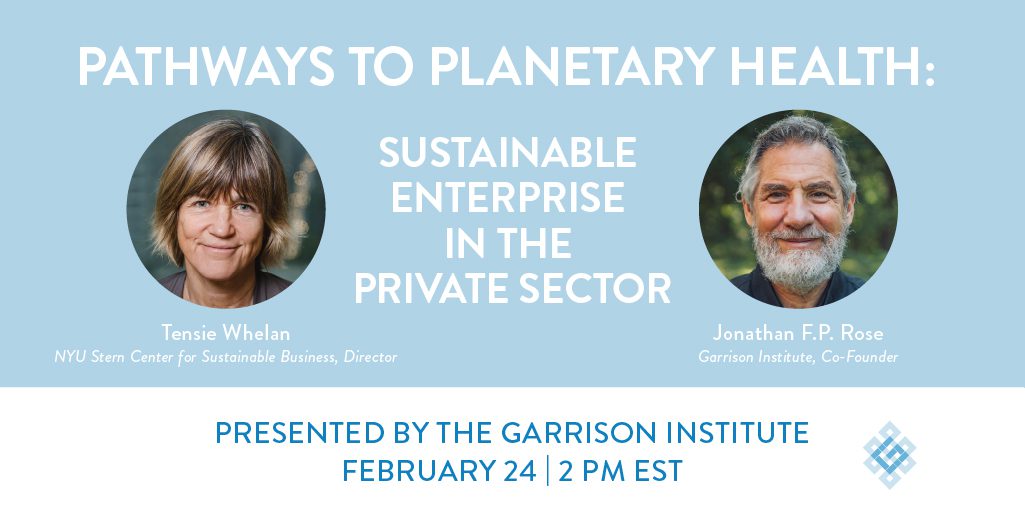Tensie Whelan On Sustainable Enterprise in the Private Sector
On February 24, we continued the Garrison Institute Forum on Pathways to Planetary Health (PPH) with a conversation between Tensie Whelan, Director of the Center for Sustainable Business at NYU and former president at the Rainforest Alliance, and Garrison Institute co-founder Jonathan F. P. Rose. Tensie is dedicated to working across businesses and communities on innovative solutions for environmental protection. In her conversation with Jonathan Rose, she discussed how businesses and investors have evolved in this regard, and where they still have room to grow.
In one example, she recounted a boycott, led by US NGOs, against McDonalds due to cattle-induced deforestation. McDonalds pulled out of Costa Rica as a result, which forced local populations into slash-and-burn agriculture. The US NGOs may have been correct about the problem, but they were wrong about the solution.
“People aren’t cutting down forests because they’re bad people. They’re cutting them down because there are pressures on them to do that.”
The question became, ‘how do we ensure people have sustainable livelihoods, and that natural resources will be there for them and future generations?’
Tensie’s work with the Rainforest Alliance helped solve this challenge by using certifications to direct buying power for positive change through the open market. The Forest Stewardship Council certification addresses logging practices, including social-cultural issues. Working with NGOs from Latin America, Tensie then worked to create a global sustainable agriculture standard. Private companies that adopted this standard became market leaders, which led to their competition adopting the standard, further amplifying the effect.
Now at NYU, Tensie leads research on investor and corporate ESG returns. A recent meta-analysis found a positive correlation between ESG and financial performance in over 50% of cases. She also leads the Return on Sustainability Investment (ROSI), which bridges the gap between sustainability strategies and ESG and financial performance.
Tensie draws an important distinction between reporting on ESG, such as new standards from the International Financial Standards Reporting Foundation (IFRS), and management-driven corporate impact. She recommends a focus on impact- and outcome-oriented reporting, not simply activity-oriented reporting, which is often missing in ESG standards today.
Tensie and Jonathan ended their discussion talking about how capitalism needs to evolve, and how to create an Ecological Civilization. The evolution away from shareholder primacy and quarterly returns is part of the answer. Another piece revolves around resource consumption. Current per-capita natural resource use correlates with the level of national development; decoupling this so that more people can have higher quality lives and we can maintain our planet’s natural resources is the key. Tensie put it succinctly: it’s a business opportunity.
We invite you to revisit this conversation, and we hope that it is a source of wisdom and inspiration.
This interactive online event was part of a continuing series in the Garrison Institute’s Forum on Pathways to Planetary Health (PPH). Pathways to Planetary Health explores the moral, ethical, and human behavioral dimensions of the search for regenerative solutions, including Half-Earth, Ecological Civilization, Regenerative Economics, and The Common Good.
***
You can find more information about Tensie Whelan and her work here.
